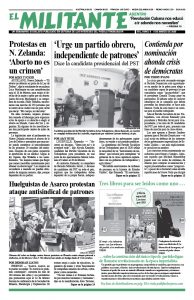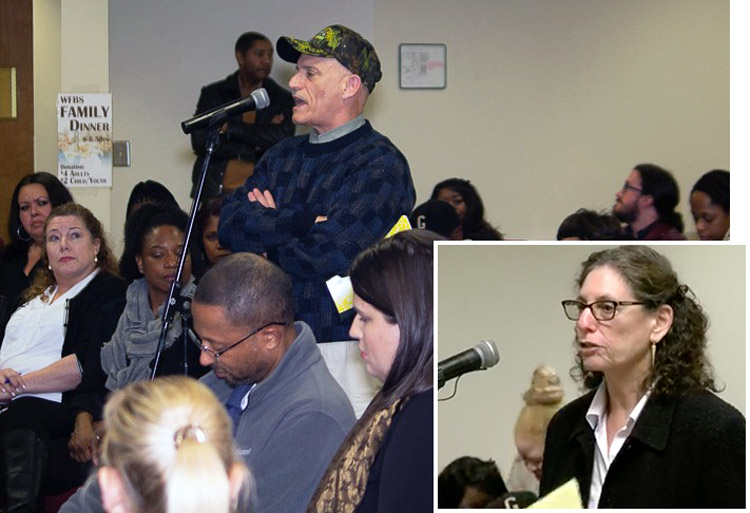MARIETTA, Ga. — “It’s monstrous what they are doing. How do we allow this?” asked Wanda Webb, one of dozens of family members and former inmates who spoke out at a Feb. 18 meeting here protesting conditions at the Cobb County Adult Detention Center.
The meeting was sponsored by the Cobb County Southern Christian Leadership Conference, American Civil Liberties Union of Georgia, Cobb County NAACP and other groups demanding an independent investigation of the conditions and treatment meted out at the center. Speakers were both African American and Caucasian.
Many of the inmates are waiting for a court date and haven’t been convicted of any crime. Seven have died in custody there in the last 14 months.
Webb said her 19-year-old son has lost more than 20 pounds and had been beaten. “He is thinking of taking a plea deal just so he could get out of there,” she said.
“What happened to innocent until proven guilty?” asked another mother who did not want to give her name fearing retaliation against her son. “We must do something.”
Another mother pointed out that many of the young men are being detained simply on the accusation of a police officer. “And we know they are known for lying,” she said.
Former inmate Susan Janette McCoy, who was wearing an ankle monitor, said conditions are “degrading and inhumane.” She described seeing guards use a Taser on a fellow inmate just because he was singing.
Family member after family member described how their son or daughter would tell them how hungry they were and how they had suffered significant weight loss. They told of black mold on the food trays.
Ivy Treadwell-Garcia said she had been detained at the center for six months. “I can corroborate what everyone is saying,” she said. “I have severe food allergies, but when I was booked in they wouldn’t give me access to my EpiPen. I lost 30 pounds.”
A monthlong lockdown kept inmates in their cells for 23 hours and 45 minutes a day, with no contact from family members and no letters or phone calls.
Tahj Hill, detained for three months for a probation violation, spoke about the isolation during the monthlong lockdown. “Panic buttons to call for a guard weren’t working or just ignored,” he said, resulting in at least one of the deaths.
Rebecca Carlson, a cousin of William Kocour who died in September, said the family believes he wasn’t given proper medical care. “I want justice for all the inmates incarcerated who are facing this kind of treatment,” she said.
Rachele Fruit, Socialist Workers Party candidate for U.S. Senate from Georgia, also spoke. “This is a working-class issue,” she said. “ I work at Walmart and many of my co-workers or their family members have also faced these same conditions. In Cobb County this may be particularly outrageous, but this type of abuse exists in prisons across the country. This is how the capitalist state treats working people to try to keep us in line.
“They aim to break our spirit, our humanity,” she said. “No human being deserves this kind of treatment. My campaign will be speaking out about this fight.”
Cynthia Busby said her son told her he had no clean blanket, no TV or radio, and had to fight to get his hands on a newspaper that inmates had to share. Books are sharply limited — no more than five — regardless of how long someone was incarcerated.
Copies of a Jan. 12 edition of the Marietta Daily Journal that reported on complaints of the inhumane treatment at the jail from an earlier public meeting were banned. This was challenged by the ACLU.
Fruit told several of the participants after the meeting about the successful fight waged by the Militant that overturned suppression of the paper in prisons in Florida, Indiana and other states.
“We call for an end to solitary confinement, for abolishing the death penalty, and for the right to vote for ex-prisoners and all workers behind bars,” she said, pointing to her campaign program. “We oppose the entire capitalist injustice system, and are for building a movement of millions to fight for these demands.”


